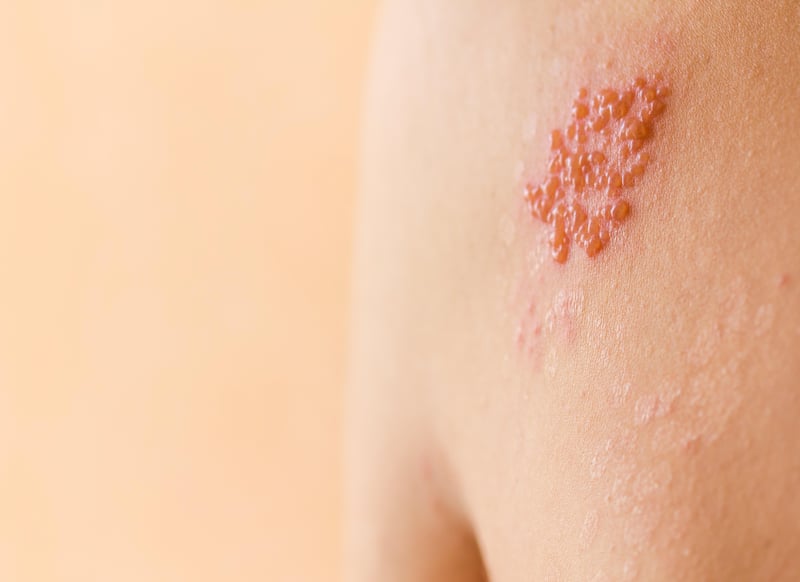Get Healthy!

- Amy Norton
- Posted December 5, 2022
Shingles Ups Odds of Stroke, Heart Attack By Almost 30%
People who've had a bout of shingles may face a heightened risk of heart attack or stroke in later years, a new, large study suggests.
Anyone who ever had chickenpox can develop shingles -- a painful rash that is caused by a reactivation of the virus that causes chickenpox. About one-third of Americans will develop shingles in their lifetime, according to the U.S. Centers for Disease Control and Prevention.
The new study, of over 200,000 U.S. adults, found that those who'd suffered a bout of shingles were up to 38% more likely to suffer a stroke in the next 12 years, versus those who'd remained shingles-free. Meanwhile, their risk of heart disease, which includes heart attack, was up to 25% higher.
The findings, published recently in the Journal of the American Heart Association, do not prove that shingles directly raises the risk of cardiovascular trouble.
But it is biologically plausible, according to the researchers: The reactivated virus can get into the blood vessels, causing inflammation, and that could contribute to cardiovascular "events" like heart attack and stroke.
Some past studies have found that cardiovascular risks can rise after shingles, but they have looked at the short term.
It hasn't been clear how long that risk persists, said Dr. Sharon Curhan, the lead researcher on the new study.
"Our findings demonstrate that shingles is associated with a significantly higher long-term risk of a major cardiovascular event, and the elevated risk may persist for 12 years or more after having shingles," said Curhan, of Brigham and Women's Hospital, in Boston.
That's an important finding, said Dr. Elisabeth Cohen, an ophthalmologist and professor at NYU Grossman School of Medicine, in New York City.
"What they're showing is the short-term risk doesn't just go away," said Cohen, who studies shingles-related eye disease.
While shingles is very common, it is not taken as seriously as it should be, according to Cohen.
It all starts with the chickenpox virus, called varicella zoster. Once a person contracts that virus -- as nearly every American born before 1980 has -- it remains dormant in the body, hiding out in the nerves.
Generally, the immune system keeps the virus in check. But when a person's immune function weakens -- due to age, illness or medications, for instance -- the varicella zoster virus can reactivate, causing shingles.
Typically, shingles causes a painful skin rash consisting of fluid-filled blisters, and usually clears up in a few weeks, according to the CDC.
In some cases, shingles affects the area around the eye -- a condition called herpes zoster ophthalmicus -- which can lead to serious problems like ulcers on the cornea and lasting vision loss. Meanwhile, between 10% and 18% of people with shingles develop postherpetic neuralgia (PHN), nerve pain that can last for months to years after the skin rash recedes.
Shingles eye disease, Cohen said, is linked to a greater risk of stroke in the short term, compared with milder shingles.
The latest study looked at shingles as a whole. Curhan said it's not clear whether shingles complications, like PHN and eye disease, are tied to greater increases in the risks of heart disease and stroke in the long term.
Through much of the study period, there was no shingles vaccine.
The good news is there is now a highly effective one available, both doctors said.
"Shingles vaccination could provide a valuable opportunity to reduce the burden of shingles, and also possibly reduce the risk of cardiovascular complications," Curhan said.
The CDC recommends that adults age 50 and older get two doses of the shingles vaccine, called Shingrix. It's also recommended for people age 19 and up who have weakened immune systems due to disease or medical treatments.
The vaccine is over 90% effective at preventing shingles and PHN in healthy adults, with immunity remaining strong for at least seven years, the CDC says. It's somewhat less effective for people with weakened immunity.
The latest findings are based on over 200,000 U.S. health professionals who were followed for up to 16 years. During that time, just over 3,600 had a stroke, while 8,620 developed heart disease.
Overall, people with a history of shingles were up to 38% more likely to suffer a stroke, with the risk being greatest five to eight years post-shingles. Similarly, their risk of heart disease was up to 25% higher, peaking at nine to 12 years after their shingles episode.
Those were the risks after the researchers took many other factors into account -- including age, chronic health conditions, weight, exercise habits and smoking.
Anyone unlucky enough to have had shingles can, unfortunately, get it again, Cohen pointed out. So those people should be vaccinated when eligible, too.
"Most of us who've had shingles -- and I'm one of them -- never want to get it again," Cohen said.
More information
The U.S. Centers for Disease Control and Prevention has more on shingles.
SOURCES: Sharon Curhan, MD, ScM, physician and epidemiologist, Brigham and Women's Hospital, Harvard Medical School, Boston; Elisabeth Cohen, MD, professor, ophthalmology, NYU Grossman School of Medicine, New York City; Journal of the American Heart Association, Nov. 16, 2022, online




